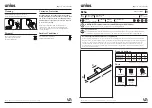
one allows you to check progress without letting heat escape. You can keep track of the air temperature
inside the ‘greenhouse’ with an oven thermometer, and it is also wise to have a thermometer with a
metal probe so you can check the temperature of
the centre of your food. Depending on the quantity
and type of food you are cooking, it will take
between two and six hours to cook. You will have
to move the cooker every hour or two to make sure
the sunlight is reflected onto your cooking vessel.
In practise, you can set up the cooker so that it will
be pointing directly at the sun in about an hour’s
time, then move it again after two hours. As long
as it is in a safe place, free of interference or
shade, it can be left to cook your food without any
danger that it will burn.
Place your food in the
cooking vessel, then place the vessel on a trivet
inside the greenhouse. Apart from re-aiming your
CooKit
every two hours, there is nothing else to do.
The picture on the left shows a small oven
thermometer, a short trivet, and a matt black
cooking vessel inside a large borosilicate bowl with a transparent borosilicate lid (the ‘greenhouse’). A
plastic microwave food bag could be used instead of the borosilicate bowl and lid.
Cooking
CooKits
are best suited to cooking water based one-pot dishes, like soups or stews. In the UK,
CooKits
operate best in bright sunlight between May and September. The earlier in the day you begin cooking,
the better the chance of success. You can easily cook, say, chick-peas with a
CooKit
over a day without
pre-soaking them. There are no ‘hot-spots’ in a
CooKit
, so your food will cook evenly and never burn.
You do not need to turn the food, or stir it. In fact, it is better not to allow heat to escape by removing the
lid if you can avoid it. You can brown scones with a
CooKit
, but the temperatures reached are too low to
bake bread with a proper crust. For recipes and ideas about what to cook, why not visit the blog on our
website at:
www.slicksolarstove.com
Caring for your
CooKit
The reflective material on your
CooKit
is plastic and can be cleaned with a damp cloth. Be careful not to
get water on the back of your
CooKit
as it is made of cardboard. If it is left out in the rain, it will quickly
become food for slugs. With care, and if kept dry, it should last you a few solar cooking seasons.
Cookware and accessories
(Note: This document appears on our website – you can
access the links below
from there)
When you assemble your solar cookware, think about the size of each component. For example, make
sure you there is space to remove your HOT cooking vessel from the ‘greenhouse’. You may already
have suitable items in your kitchen, but here are some sources for the sorts of items you may find useful.
Cooking vessel
– Almost any non-shiny black container will do.
Make sure it fits inside your
‘greenhouse’.
Any black enamelled ‘speckleware’ (
http://tinyurl.com/q6kcktx
), or black anodised
aluminium container like this (
http://tinyurl.com/nvbfo54
) with the handles removed will do a good job.
Black cast iron cookware is also suitable, but takes much longer to heat up.
Greenhouse
– These cooking bags (
http://tinyurl.com/ohnnl32
) are suitable, but for a more permanent
solution, consider these large borosilicate containers (
http://tinyurl.com/og4pduy
). If you get one of
those, you will need a lid (
http://tinyurl.com/q8r8nsp
) Or get two of these, one inverted on top of the
other (
http://tinyurl.com/or476cy
) but try to get them with a ‘lip’ so you can clip them together.
Oven Gloves
– Silicon gloves are best: We prefer this type (
http://tinyurl.com/oh44kby
).
Thermometers
– Oven thermometers like these (
http://tinyurl.com/onzkvdg
) are good for monitoring
greenhouse air temperature, but you need this type (
http://tinyurl.com/oty3v7z
) to check your food.
Our mission
Here at SLiCKsolarstove we hope to encourage the use of solar and integrated cooking in the UK. We
welcome contact from solar cooks in the UK and we are keen to hear of your experiences – successes
and
failures – so we can all learn from each other. Please visit our website frequently and let us know
how you are doing and/or ask for advice. We will always do our best to help.




















